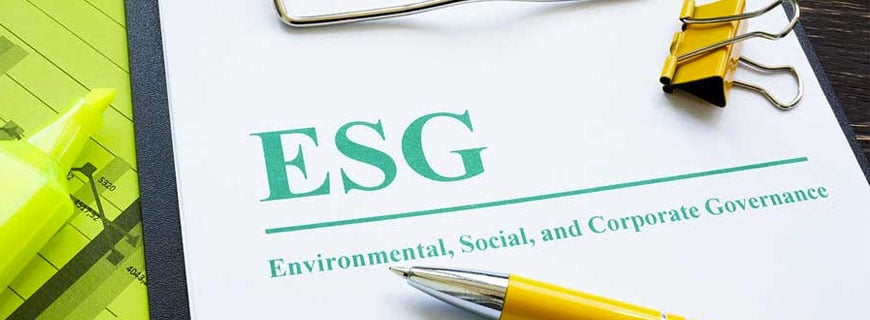It’s nearly impossible today to focus any content around sustainability and not touch upon ESG - especially for companies like ours (BKM Marketing), with a client base that is deeply rooted in financial services. But what is ESG, and why should you care? If you don’t create corporate policies or procedures, or have regulators to answer to, does it affect you?
In a nutshell, (from a sustainably planted tree): yes.
Per Investopedia, “Environmental, social, and governance (ESG) criteria are a set of standards for a company’s operations that socially conscious investors use to screen potential investments. Environmental criteria consider how a company performs as a steward of nature. Social criteria examine how it manages relationships with employees, suppliers, customers, and the communities where it operates. Governance deals with a company’s leadership, executive pay, audits, internal controls, and shareholder rights.”

Environmental Criteria
Environmental Criteria is probably the easiest to wrap your head around - this includes the energy and resources a company takes from the environment, and the byproducts created for taking it. This, of course, includes carbon emissions that are responsible for climate change.
- How does my company dispose of hazardous waste?
- Does my company sell or create a byproduct that harms the environment?
- Does my company contaminate land?
Social Criteria
Social Criteria refers to a company’s approach to the relationships between them and the people and communities they do business with. Diversity, inclusion, and equality are the basis of this standard.
- Does my company discriminate based on race, gender, economic status, or anything else?
- Does my company give back to the community?
- Are health and safety prioritized by my company?

Governance Criteria
Governance Criteria are the practices and procedures which your company uses to make decisions, meet the needs of stakeholders, and do so while complying with the law. This criteria is probably the easiest to check, as companies have had certain codes of conduct long before the term ESG was coined.
- Is my company transparent with stakeholders?
- Are there any conflicts of interest amongst the board members?
- Does the company engage in any illegal activity?
Increasingly, investment firms have been examining companies’ ESG criteria, and are only investing in those that avoid certain risk factors. Per Investopedia, “In years past, socially responsible investments had a reputation for requiring a tradeoff on the investor's part. Because they limited the universe of companies that were eligible for investment, they also limited the investor's potential profit. "Bad" companies sometimes performed very well, at least in terms of their stock price. More recently, however, some investors have come to believe that ESG criteria have a practical purpose beyond any ethical concerns. By following ESG criteria, they may be able to avoid companies whose practices could signal a risk factor—as evidenced by BP's (BP) 2010 oil spill and Volkswagen's emissions scandal, both of which rocked the companies' stock prices and resulted in billions of dollars in associated losses.”
Additionally, companies should care if they want to retain talent and increase profits.
People are embracing ESG. People want to work for companies that give back to their communities, they want to shop at places that pay their employees a fair wage and prioritize health and safety, and they understand that the long-term return on their personal investments is a more sustainable global community.
There’s an old saying that goes “The best time to plant a tree was 20 years ago. The second-best time is now”. The same can be said for prioritizing ESG criteria.

Does your company have any ESG measures in place that make you proud to work there? Either submit a comment below or feel free to email me at mallinson@bkmmarketing.com
Interested in learning more?
FEATURED ARTICLEDelve into the harsh reality of the current global climate crisis with BKM Marketing's Climate change. We know what to do – we just need to do it. See how BKM Marketing took responsibility for their actions and the steps we took to understand how BKM, as a small business, contributed to climate change and what we could do about it. See firsthand that "the good part of the story is that we can do this. We know what to do – we just have to decide to do it." Get started with Climate Change - We know... >> |
NET ZERO NOWDiscover how BKM Marketing partnered with Suffolk University's Sawyer School of Business to identify certifications and benchmarks towards offsetting a small business' carbon impact, develop methods of calculating carbon impact, and ways to mitigate environmental impact - specifically as it pertains to direct mail and digital marketing. Learn how we adapted our business practices to become the blueprint for how agencies can become carbon neutral to become Net Zero Now. Learn how agencies can be carbon neutral >> |
BKM Marketing's content is made with our audience in mind. Our downloadable PDF guides are free
to save, search, share, reference, or print at their convenience. Visit our Resource Library to see more >>


![[6] Steps to Understand + Connect with Your Audience](https://www.bkmmarketing.com/hubfs/Mail%20symbols%20with%20woman%20using%20device%20in%20a%20beige%20chair.jpeg)




SUBMIT YOUR COMMENT